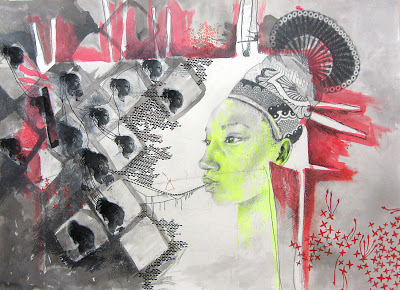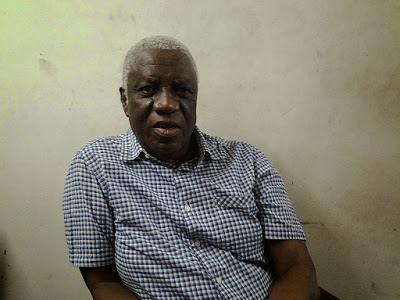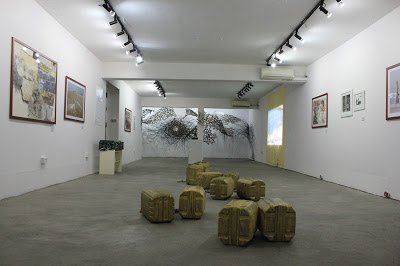 |
| Exhibition Installation view by Jude Anogwih |
The recent work ‘ No one belongs here more than you,’ put together by three Nigerian artists, Nnenna Okore, Wura-Natasha Ogunji and Ruby Onyinyechi Amanze, was opened in an exhibition on June 15, at the Centre for Contemporary Art (CCA), Lagos and would be on till September 14, 2013.
Supported by the Museum of Contemporary African Diasporan Arts (MoCADA), the collection of works present diverse perspectives on issues of the use of space and interactions; the feeling of having to deal with not belonging to a place; the presence of women in public spaces and the interaction that develops.
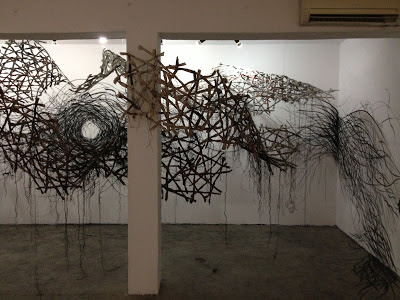 |
| ‘Hiding from the Sun’ by Nnenna |
For the simple reason that all three artists live abroad and just happen to be back home in Nigeria at the same time, and decided to work together, is, according to the introductory note by CCA, “an experience that marks the onset of a journey of reintroduction, rediscovery and reconnection to their ancestral place of origin.”
Speaking with Ogunji on the inspiration that led them to bring their works together, she said, “ We thought it will be important for us to talk about the works that we are making right now in Nigeria, giving the fact that we don’t live here full- time.
“It is also important because we have different perspectives expressed through our works and sharing on them will be great.”
Ogunji sees the complexity of the title as not particularly about them , but about who belongs where and what it means to belong and who is referred to as the ‘you’ in the title.
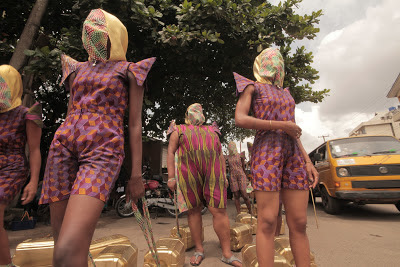 |
| Performance by Wura-Natasha |
Okore may have presented an installation work that has a strong expression of aesthetics yet, it makes a statement of definition as she aptly states that the works invite people to think about their role in the space and what gives them a sense of belonging. “The questions would be ‘why do you belong here or why shouldn’t you belong here; or what makes you a member of a particular space or place?”
She underlines the broad discussion of the works, but recognises also that issues of identity come up in very subtle ways. She says “Ruby and I especially think of how this place influences us and how we are connected to this place.”
For Ruby Onyinyechi Amanze, it is a two-way experience. Though born of Nigerian parents, she was raised outside Nigeria, yet, she would not agree to be speaking from an outsider point of view even if she was considered as one. She says, “it is more like working to see how you can balance two identities; being a foreigner on one hand and an indigene on the other.”
Interestingly, the works presented by each of these wonderful artists speak volumes of what they hold within them. Their efforts have expressed what they want to share with the world.
For the exhibition, Okore’s ‘Hiding From The Sun’ expresses the lush and beautiful use of space, according to her. In my perspective however, the installation presents a form of the kind of environment she may have been used to during her growing up years in Enugu.
Amanze talked deeply on the importance of language as a form of identity and one of her works titled ‘Tongue-tied’ tells more in details. In spite of the available communication gear( like a satellite dish), the person in the picture still has a major challenge( Language) that makes communication difficult.
Other works by Amanze are not only attractive for their outward aesthetic, but also as they relate to the theme of the exhibition, ‘ No one belongs here more than you.’
Performance art has become closely identified with Wura-Natasha. She authoritatively played around a number of themes with her works in this exhibition yet, she plays out the challenges women go through in her performance titled ‘Will I still carry water when I am a dead woman?’
She wonders aloud, “when will women chat away with one another?” She was moved by the daily experience of women fetching water for every chore in the home. She actually experienced how a man allowed his wife to keep fetching water with kegs from outside the house, rather than fix a system to take the water into the house.
She imagined that the women could be like the Egungun masquerade(found among the Yoruba-speaking ethnic group in Nigeria), who would be revered and allowed to move about freely, and not tied to endless hours of home chores like she experiences now.
This exhibition testifies to the artistic mien of these respectable artists.


















































